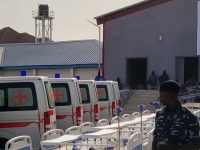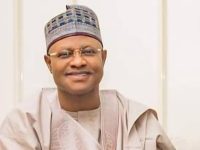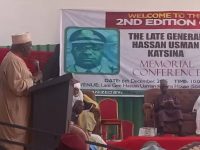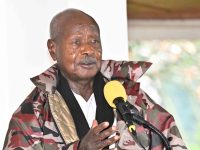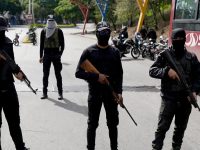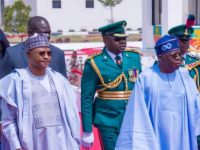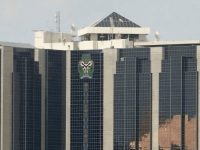GROUP PETITIONS UK PARLIAMENT, WARNS OF LOOMING INSTABILITY, WANTS WIKE SANCTIONED FOR ANTI-DEMOCRATIC ACTS

A civic movement under the banner Nigeria Unite has petitioned the United Kingdom Parliament, raising alarm over what it describes as the rapid disintegration of Nigeria’s democracy under the watch of ruling party elements — with FCT Minister Nyesom Wike fingered as the chief architect of an unfolding crisis.
In the petition signed by Sunday Daniel and addressed to Dame Emily Thornberry, Chair of the Foreign Affairs Committee, the group accused Wike and his collaborators of weaponizing state power to silence opposition, manipulate institutions, and subvert the rule of law — warning that their actions mirror the authoritarian patterns that have already consumed Mali, Burkina Faso, and Niger.
The petition describes a “systematic campaign to emasculate opposition voices” through intimidation, judicial manipulation, and resource blackmail. It alleges that the Minister’s unchecked influence, coupled with the All Progressives Congress’ growing intolerance for dissent, is steering Nigeria dangerously close to one-party rule.
“Democratic institutions are being hollowed out,” the petition states, citing the National Assembly’s growing subservience to the executive, the muzzling of opposition politicians, and the weaponization of state resources to force defections into the ruling party.
Nigeria Unite urged the African Union, European Union, and Western governments to intervene urgently, calling for targeted sanctions against Wike, complicit judges, and security officials. The group warned that the collapse of democracy in Nigeria — Africa’s most populous nation — could trigger continent-wide instability, migration surges, and a full-scale humanitarian crisis.
“If unchecked,” the petition concludes, “the reckless conduct of Wike and his enablers will not only destroy Nigeria’s democracy but set the entire Sahel region on fire.”
The group regretted how President Tinubu gave unlimited leverage to the FCT Minister Wike to veer into national political party matters.
Full version of the petition
#NIGERIA UNITE
The Rt Hon Dame Emily Thornberry MP
Chair, Foreign Affairs Committee House of Commons
London SW1A 0AA United Kingdom
Date: 11/11/2025
Dear Dame Emily Thornberry,
We the undersigned citizens and advocates express concern about declining democratic institutions in Nigeria which is Africa’s largest democracy. The deterioration of democracy in the Sahel region signifies a regional crisis that poses a growing threat to international peace and stability with direct implications for migration control, affecting Europe.
Imminent Collapse of Democracy in the Sahel Region (West Africa)
The current trajectory of political events in the Sahel region of West Africa suggests an imminent collapse of democracy that threatens not only Nigeria, the largest democracy in the Black world, but also the stability and democratic integrity of the entire Sahel region.
Current State of Democracy in the Sahel Region
The Sahel region is now witnessing a troubling regression. Three West African states have succumbed to authoritarianism, The West African nations currently under military rule are Mali, Burkina Faso, and Niger. These three countries are led by military juntas and have jointly withdrawn from the Economic Community of West African States
(ECOWAS).
Mali: Seized power in August 2020 and has since been ruled by a military junta, most recently dissolving all political parties in May 2025.
Burkina Faso: Experienced a coup in January 2022 and another in September 2022 and is currently under military rule.
Niger: Experienced a coup in July 2023.
These three countries, along with others in Africa, are part of a recent trend of military takeovers, driven by factors like weak governance, erosion of democratic institutions, insecurity, and public frustration with civilian governments. This erosion of democratic norms is not merely a political concern; it poses a direct threat to peace, stability,
security, and human rights in the region. The fragility of democratic institutions in these countries has created a vacuum that extremist groups and authoritarian leaders are eager to exploit.
The Troubling Situation in Nigeria
At the heart of this crisis lies Nigeria, a nation that has historically been viewed as a beacon of democracy in Africa. However, recent events have raised grave concerns about the stability of its democratic institutions, the rule of law and internal democracy. Reports of a coup attempt in Nigeria underscore the precariousness of its democratic framework. The
implications of such a development are profound, as Nigeria’s democratic health is
intrinsically linked to the broader stability of the Sahel region and to European waters.
There is currently a systematic campaign to undermine opposition voices and
consolidate power. The deliberate emasculation of opposition parties is evident in the actions of key figures such as Nyesom Wike, the Minister of the Federal Capital Territory. Wike, once a political operative known for his willingness to engage in morally dubious activities during the administration of Goodluck Jonathan, now wields immense power. His criminal notoriety extends to manipulating the judiciary, the police, and the Independent
National Electoral Commission (INEC) to stifle dissent and weaken opposition parties. The political landscape has become increasingly fragmented, with factions emerging within the opposition.
Rivers State
The relationship between Wike and his successor, Siminalayi Fubara, deteriorated in 2023, leading to a split in the state legislature, legal battles, and factional claims to
control the Rivers State legislature. The State House of Assembly faced a fire incident after a fallout between Wike and Fubara, resulting in factions loyal to each leader and legal actions seeking judicial legit imization of control over legislative duties.
APC’S Dictatorship
The All Progressive Congress (APC) has used coercion, intimidation and inducements to muscle the political space in Nigeria overshadowing the facade of multi-party democracy. This forceful bulldozing has affected opposition parties like the People’s Democratic Party (PDP) and the Labour Party (LP), weakening their ability to challenge effectively. There is a significant influx of politicians, including governors, senators, and local government officials, forced to switch to the APC, posing a threat to the diversity of Nigeria’s political landscape.
The continuous defections to the APC raise concerns about Nigeria transitioning into a one-party state, stifling opposition voices and compromising the democratic process in the style of the late General Sani Abatcha.
The African Democratic Congress and LP face internal struggles caused by the actions of Wike, further weakening the opposition and diminishing the chances of a robust democratic process.
Wike’s Onslaught on the opposition parties in Nigeria especially the PDP, LP, and ADC.
Beyond the ADC and the LP, Wike’s criminal encroachment extends to the internal workings of the PDP, where the National Working Committee (NWC) suspended several National Officers due to anti-party activities. This suspension is in accordance with specific
sections of the Party’s Constitution, and the suspended officers will face a one-month suspension, subject to review by the National Disciplinary Committee. However, Wike’s use of state resources to seal the PDP Secretariat raises concerns about the legitimacy of the party’s internal governance and the potential for the INEC to recognize the suspended individuals as legitimate leaders. If the trend continues unchecked, future elections in Nigeria may become mere endorsements of predetermined outcomes, leading to a democracy devoid of choice, competition, and accountability.
The Erosion of Democratic Norms in Nigeria
The erosion of democratic norms in Nigeria is further exacerbated using public resources to lure opposition leaders into the ruling party. While constitutional provisions allow for party-switching, the reckless deployment of state resources to entice dissenting voices to defect undermines the very essence of democratic competition. This practice not only fosters a culture of corruption but also creates an environment where opposing views are systematically silenced.
The allocation of resources is starkly unequal. Governors from the ruling party are showered with immense financial support, while their counterparts from opposition parties are deliberately starved of resources, effectively crippling their ability to function and compete in the political arena. This imbalance further consolidates power within the ruling party and diminishes the prospects for a robust democratic process leading up to the 2027 elections.
The Gagging of Opposition Voices
As the political environment in Nigeria becomes increasingly oppressive, we witness the gradual gagging of opposition voices. The chilling effect of state-sponsored intimidation and coercion leaves little room for dissent. With the 2027 elections on the horizon, the absence of a vibrant opposition could culminate in a political environment devoid of accountability, transparency, and genuine democratic choice.
Weak National Assembly
The National Assembly in Nigeria has been heavily overwhelmed by the executive, leading to a decline in its effectiveness and independence. Allegations of abuse of power and lack of checks and balances are rampant. The current National Assembly is criticized for endorsing the executive’s abuse of power, effectively becoming an extension of the executive branch rather than maintaining its role as a separate entity.
Observations
- The President is empowering Wike to suppress the opposition in Nigeria through intimidation, bribery, and chaos, leading to a threat to Nigeria’s stability.
- The potential collapse of democracy in Nigeria could lead to widespread unrest as the opposition responds with mass actions.
- The destabilization of Nigeria, with its large population of 250 million people, would have repercussions across the entire African continent and beyond, including immigration to Europe and the US.
- By far, a destabilized Nigeria will certainly threaten the peace and security of the entire sub-Saharan Africa. As the most populous country on the continent and one that continuous to influence peace and stability across the sub-continent, any breakdown of law and order will only compound the security and humanitarian situations in the region. This will further worsen the continent, disrupt international cohesion, compound the despondent cases of human trafficking, migration and other challenges the continent and the world are now facing.
Our Prayers for Action
In light of the urgent situation described above, we respectfully appeal to the African Union, European Union, the United Kingdom, and the United States —esteemed custodians of global democracy—to act swiftly and decisively to protect democratic governance in Nigeria. The preservation of democracy in Nigeria is not merely a national concern; it is a regional imperative. A failure to address the encroaching authoritarianism in Nigeria could precipitate a domino effect, leading to further democratic erosion across the Sahel.
We specifically call for the following actions: - Immediate Intervention:
We urge the African Union, the United States, and the United Kingdom to take a proactive stance in safeguarding democracy in Nigeria. Diplomatic engagement, monitoring electoral processes, and offering support to civil society organizations are essential steps in this endeavour. - Targeted Sanctions:
We implore the international community to impose targeted sanctions against Nyesom Wike, the architect of many of these anti-democratic machinations. Measures such as visa bans, and the confiscation of assets abroad would send a clear message that the international community will not tolerate the undermining of democratic principles. - Accountability for Compromised Officials:
In addition to targeting Wike, we advocate for similar punitive measures against the compromised judges and police officers who facilitate the enforcement of his schemes. Holding these individuals accountable is crucial for restoring the rule of law and rebuilding public trust in Nigeria’s democratic institutions.
4 . We strongly advocate for the immediate sanctioning of public judicial officials implicated in collusion with Wike in this alarming scheme. Noteworthy among these individuals are John T. Tsoho, Peter Odo Lifu, Joyce Obehi Abdulmalik, and James K. Omotosho, whose actions undermine the integrity of our judicial system. Additionally, the Commissioner of Police of the Federal Capital Territory and the Independent National Electoral Commission must be held accountable for their roles in this troubling alliance. Ensuring accountability is essential to restore public trust and uphold the rule of law in our democratic processes.
Conclusion
The stakes are high, and the time for action is now. The imminent collapse of democracy in the Sahel region is a reality that demands our collective attention and intervention. By taking decisive steps to support democracy in Nigeria, we can avert a humanitarian and broader crisis that may lead to immigration catastrophe that can threaten not only the very fabric of governance in West Africa but in Europe and the world at large.
We thank you for your attention to this pressing matter and look forward to your prompt action in defence of democracy.
Sincerely,
Sunday Daniel,
National secretariat,

